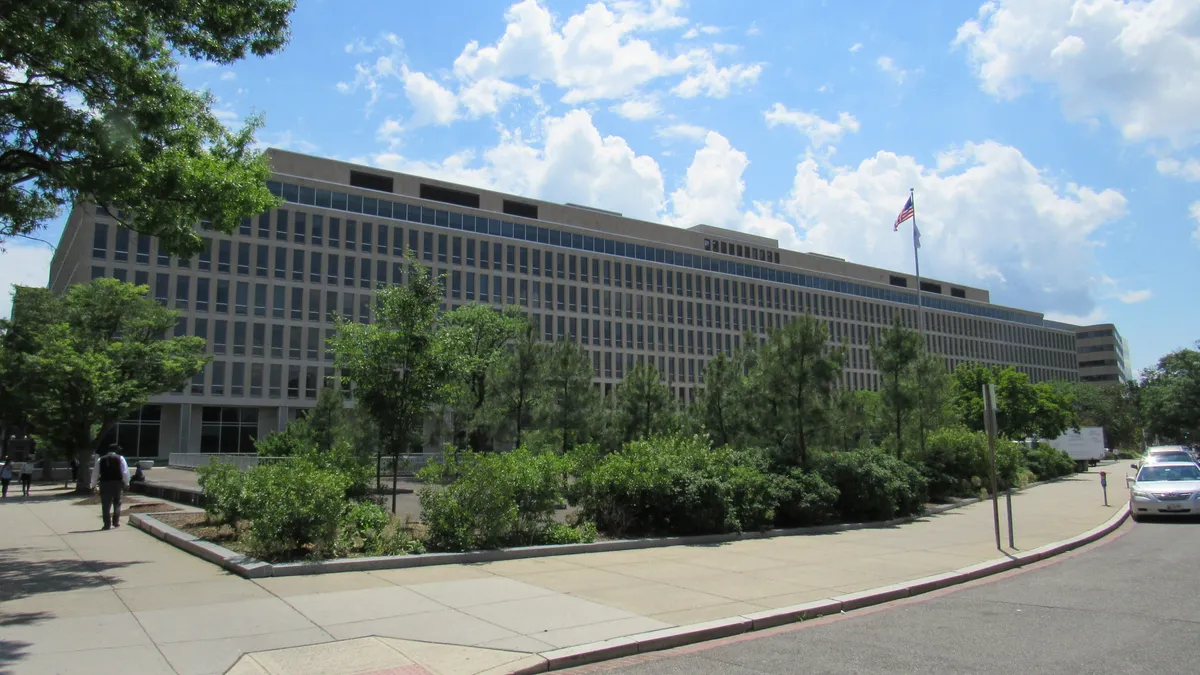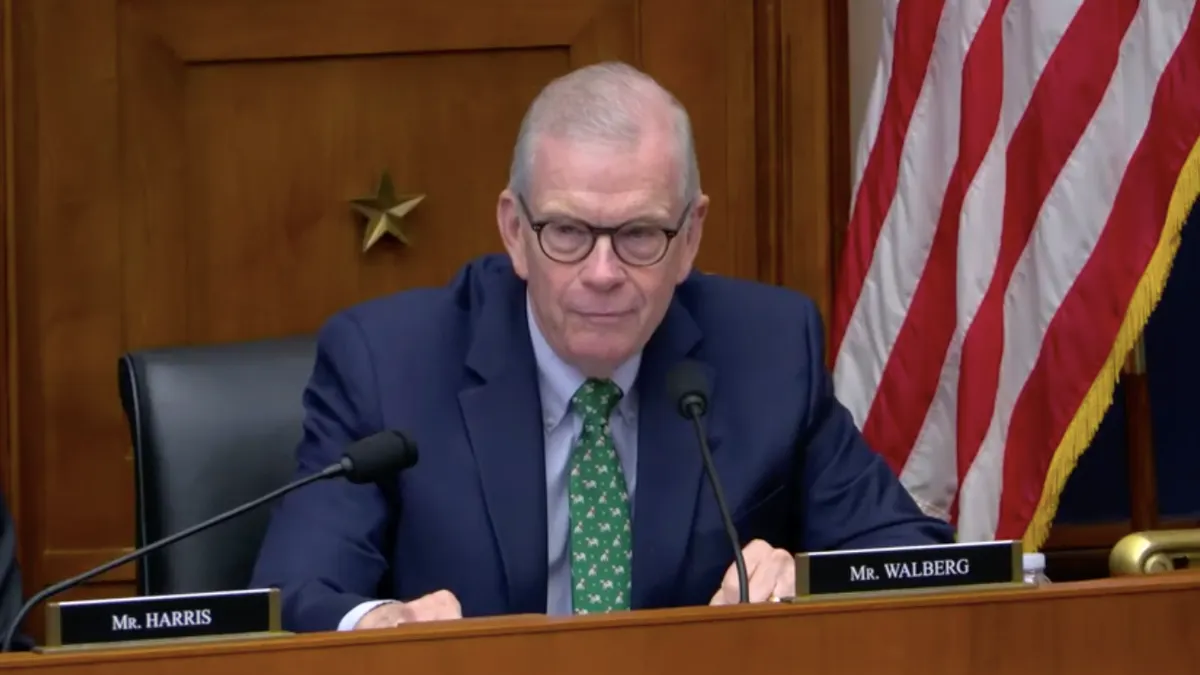The U.S. Department of Education has brought back systemic reviews of school districts accused of racial discrimination in their practices and policies, including in student discipline.
The shift revives an Obama-era practice of investigating the disproportionate impact of district policies on historically marginalized student subgroups. The practice had been reversed under the Trump administration.
"When I was here in the Obama years … we were cautious about ensuring that we were using our full authority and evaluating whether challenges in schools impacted one or a small number of students, or a broader number of students," said Catherine Lhamon, assistant secretary for the Education Department's Office for Civil Rights, in a recent interview with K-12 Dive. Lhamon also led OCR under the Obama administration.
During that time period, OCR regularly investigated districts accused of racial and other types of discrimination for "disparate impact" — a term used to describe the disproportionate and often unintentional impact of seemingly innocuous policies on traditionally marginalized students. The effort was meant to curb the overrepresentation of some racial and ethnic groups in school discipline cases, such as Black and Hispanic students.
As a result, cases of alleged racial discrimination arising from the enforcement of school discipline policies on one or a couple of Black students, for example, sometimes also led to broader systemic investigations of districts for their policies' potential harm on all Black students in that district.
Lhamon said the Biden administration's OCR under Education Secretary Miguel Cardona is now operating similarly, because "it's unusual for a school to act because they have particular animus about a particular kid."
"It's more common for a harm to have taken place for a complainant who comes to us because the school community was unaware of their legal obligations," she said.
Recent investigations of disparate impact
The current OCR has so far initiated or completed at least a handful of systemic civil rights investigations, and considers the potential disparate impact of district policies as part of those reviews.
Last August, the office settled with California's Victor Valley Union High School District in one of the most comprehensive and publicized investigations on the issue to date by the current administration. The compliance review in that case, which focused on discipline discrimination of Black students, was originally initiated in 2014 under the Obama administration and completed nearly a decade later.
"I applaud the Victor Valley Union High School District's commitment today to rectify the harms its discipline practices caused to Black students and to ensure nondiscrimination in school discipline going forward," Lhamon said in a statement when the settlement was reached last year.
As part of that case, OCR evaluated, among other things, the district's suspensions and expulsions, truancy rates, school resource officer appointments and law enforcement citations requiring students to appear in juvenile court.
"OCR found individual examples of similarly situated African American and white students with the same or similar discipline history who were disciplined differently for the same or similar infractions," said Zachary Pelchat, regional director for OCR’s San Francisco Regional Office, in a letter to the district.
Those infractions, the letter said, included "dress code violations, subjective offenses like 'defiance,' 'disruption,' and 'inappropriate behavior,' and objective offenses like truancy."
In one example Pelchat cited, a 9th grade African American student received a one-day class suspension for eating a bag of chips in violation of a "no eating" rule, while a 10th grade White student at the same school received counseling after "refusing to sit in his assigned seat, 'walk[ing] around the room repeatedly,' and distracting the other students in the class."
Ultimately, OCR found the district had “a consistent and stark pattern of a racially discriminatory effect on African American students” in how and when it chose to discipline them versus their White counterparts. The systemic investigation led to a finding of disparate treatment, which constitutes intentional discrimination. That differs from a finding of disparate impact, which is considered unintentional discrimination.
As a result, the district is required by the Education Department to identify and offer impacted students a compensatory education, hire a school climate director, create a corrective action plan, and revise discipline policies and procedures, among other remedies.
"See the broad scope of our relief there and the way that we're doing our work," said Lhamon of the settlement.
More cases could be in the pipeline
A K-12 Dive review of publicly available OCR documents found at least three other districts have been evaluated for disparate impact or treatment by the current administration, including one investigation into the impact a district's decision to permanently close a neighborhood school had on Latino students.
In that case and the others, OCR either didn't find enough evidence of disparate impact or the parties involved agreed to settle prior to any finding, per case resolution documents shared online by OCR.
OCR currently has at least 2,012 open cases of racial and national origin discrimination, some dating back as early as 2007. While it's possible that districts in some of those cases are also being investigated for disparate impact by the Biden administration, OCR does not publicize that information prior to settling.
Lhamon hinted, however, that more may be on the horizon.
"I expect — not tomorrow, not in a couple weeks, but soonish — that you'll be able to see more work in that area also," she said.
Changes in guidance, case processing
The revival of these types of investigations comes after a hiatus under the Trump administration and former OCR Assistant Secretary Kenneth Marcus, who reversed comprehensive Obama-era school discipline guidance in 2018 — four years after it was released. The 2014 guidance included how OCR conducts its disparate impact analysis.
In a letter officially rescinding that guidance, Marcus, along with the U.S. Department of Justice, said the guidance and practices "advance policy preferences and positions not required or contemplated by" existing federal law prohibiting racial or ethnic discrimination.
Other opponents of the investigative tool called it federal overreach and said it led to schools disciplining based on racial quotas rather than behavior.
Both the 2014 guidance and the 2018 reversal have been marked as being under review by the Biden administration's departments of Education and Justice since July 30, 2021.
Just prior to that review in June 2021, acting on an executive order from the White House, the Education Department requested feedback from stakeholders on how school discipline policies should be enforced and investigated. That request was met with 3,644 comments from educators, parents, attorneys, think tanks and others who varied widely in their support or opposition to disparate impact theory.
Last month, the Education Department released its own document of guiding principles for creating fair learning environments. That included the issue of school discipline and reiterated many of the same points made under the Obama administration about persistent disproportionate discipline rates for Black students.
And in 2022, OCR changed how it approaches cases with systemic allegations.
Under the Trump administration, OCR would dismiss all cases that lacked information needed to investigate an incident, had already been resolved, or were withdrawn by a complainant. Now, OCR generally only closes or dismisses these cases if there are no systemic issues involved, and it may continue to investigate if there are.
"This change suggests that OCR will exercise more discretion, possibly resulting in more investigations," according to an analysis of the changes by attorneys at Jackson Lewis, a labor and employment law firm.
Lhamon confirmed that systemic compliance reviews of districts, where warranted, are important to the current administration.
"So if a particular family complained to us about an issue, and we saw that other people are impacted by that issue, it's our job to make sure that we get relief for all of the kids that are impacted in that way," said Lhamon. "That's important for us to do. We did that then, we're doing it now."
Clarification: This article has been updated to include additional information about the outcome of the Victor Valley Union High School District investigation.







 Dive Awards
Dive Awards













